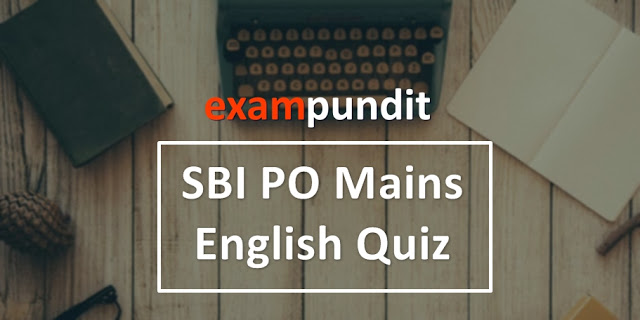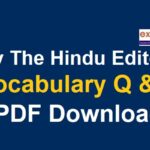

Hello and welcome to exampundit. Here is a set of English Quiz for SBI PO Mains 2017 based on the new pattern and the difficulty level is difficult.
Each of the following questions
has a paragraph from which the last sentence has been deleted. From the given
options, choose the one that completes the paragraph in the most appropriate
way.
has a paragraph from which the last sentence has been deleted. From the given
options, choose the one that completes the paragraph in the most appropriate
way.
1. I am sometimes attacked for
imposing ‘rules‘. Nothing could be further from the truth. I hate rules. All I
do is report on how consumers react to different stimuli. I may say to a
copywriter, —Research shows that commercials with celebrities are below average
in persuading people to buy products. Are you sure you want to use a celebrity?
Call that a rule? Or I may say to an art director, —Research suggests that if
you set the copy in black type on a white background, more people will read it
than if you set it in white type on a black background.“
imposing ‘rules‘. Nothing could be further from the truth. I hate rules. All I
do is report on how consumers react to different stimuli. I may say to a
copywriter, —Research shows that commercials with celebrities are below average
in persuading people to buy products. Are you sure you want to use a celebrity?
Call that a rule? Or I may say to an art director, —Research suggests that if
you set the copy in black type on a white background, more people will read it
than if you set it in white type on a black background.“
1. Guidance based on applied
research can hardly qualify as ‘rules‘.
research can hardly qualify as ‘rules‘.
2. Thus, all my so called ‘rules‘
are rooted in applied research.
are rooted in applied research.
3. A suggestion perhaps, but
scarcely a rule.
scarcely a rule.
4. Such principles are
unavoidable if one wants to be systematic about consumer behavior.
unavoidable if one wants to be systematic about consumer behavior.
5. Fundamentally it is about
consumer behavior œ not about celebrities or type settings
consumer behavior œ not about celebrities or type settings
2. Relations between the factory
and the dealer are distant and usually strained as the factory tries to force
cars on the dealers to smooth out production. Relations between the dealer and
the customer are equally strained because dealers continuously adjust prices œ
make deals œ to adjust demand with supply while maximizing profits. This
becomes a system marked by a lack of long-term commitment on either side, which
maximizes feelings of mistrust. In order to maximize their bargaining
positions, everyone holds back information œ the dealer about the product and
the consumer about his true desires.
and the dealer are distant and usually strained as the factory tries to force
cars on the dealers to smooth out production. Relations between the dealer and
the customer are equally strained because dealers continuously adjust prices œ
make deals œ to adjust demand with supply while maximizing profits. This
becomes a system marked by a lack of long-term commitment on either side, which
maximizes feelings of mistrust. In order to maximize their bargaining
positions, everyone holds back information œ the dealer about the product and
the consumer about his true desires.
1. As a result, “deal making‘
becomes rampant, without concern for customer satisfaction.
becomes rampant, without concern for customer satisfaction.
2. As a result, inefficiencies
creep into the supply chain.
creep into the supply chain.
3. As a result, everyone treats
the other as an adversary, rather than as an ally.
the other as an adversary, rather than as an ally.
4. As a result, fundamental
innovations are becoming scarce in the automobile industry.
innovations are becoming scarce in the automobile industry.
5. As a result, everyone loses in
the long run.
the long run.
3. In the evolving world order,
the comparative advantage of the United States lies in its military force.
Diplomacy and international law have always been regarded as annoying
encumbrances, unless they can be used to advantage against an enemy. Every
active player in world affairs professes to seek only peace and to prefer
negotiation to violence and coercion.
the comparative advantage of the United States lies in its military force.
Diplomacy and international law have always been regarded as annoying
encumbrances, unless they can be used to advantage against an enemy. Every
active player in world affairs professes to seek only peace and to prefer
negotiation to violence and coercion.
1. However, diplomacy has often
been used as a mask by nations which intended to use force.
been used as a mask by nations which intended to use force.
2. However, when the veil is
lifted, we commonly see that diplomacy is understood as a disguise for the rule
of force.
lifted, we commonly see that diplomacy is understood as a disguise for the rule
of force.
3. However, history has shown
that many of these nations do not practice what they profess.
that many of these nations do not practice what they profess.
4. However, history tells us that
peace is professed by those who intend to use violence.
peace is professed by those who intend to use violence.
5. However, when unmasked, such
nations reveal a penchant for the use of force.
nations reveal a penchant for the use of force.
Advertisement
(adsbygoogle = window.adsbygoogle || []).push({});
4. Age has a curvilinear
relationship with the exploitation of opportunity. Initially, age will increase
the likelihood that a person will exploit an entrepreneurial opportunity
because people gather much of the knowledge necessary to exploit opportunities
over the course of their lives, and because age provides credibility in
transmitting that information to others. However, as people become older, their
willingness to bear risks declines, their opportunity costs rise, and they
become less receptive to new information.
relationship with the exploitation of opportunity. Initially, age will increase
the likelihood that a person will exploit an entrepreneurial opportunity
because people gather much of the knowledge necessary to exploit opportunities
over the course of their lives, and because age provides credibility in
transmitting that information to others. However, as people become older, their
willingness to bear risks declines, their opportunity costs rise, and they
become less receptive to new information.
1. As a result, people transmit
more information rather than experiment with new ideas as they reach an advanced
age.
more information rather than experiment with new ideas as they reach an advanced
age.
2. As a result, people are
reluctant to experiment with new ideas as they reach an advanced age.
reluctant to experiment with new ideas as they reach an advanced age.
3. As a result, only people with
lower opportunity costs exploit opportunity when they reach an advanced age.
lower opportunity costs exploit opportunity when they reach an advanced age.
4. As a result, people become
reluctant to exploit entrepreneurial opportunities when they reach an advanced
age.
reluctant to exploit entrepreneurial opportunities when they reach an advanced
age.
5. As a result, people depend on
credibility rather than on novelty as they reach an advanced age.
credibility rather than on novelty as they reach an advanced age.
5. We can usefully think of
theoretical models as maps, which help us navigate unfamiliar territory. The
most accurate map that it is possible to construct would be of no practical use
whatsoever, for it would be an exact replica, on exactly the same scale, of the
place where we were. Good maps pull out the most important features and throw
away a huge amount of much less valuable information. Of course, maps can be
bad as well as good œ witness the attempts by medieval Europe to produce a map
of the world. In the same way, a bad theory, no matter how impressive it may
seem in principle, does little or nothing to help us understand a problem.
theoretical models as maps, which help us navigate unfamiliar territory. The
most accurate map that it is possible to construct would be of no practical use
whatsoever, for it would be an exact replica, on exactly the same scale, of the
place where we were. Good maps pull out the most important features and throw
away a huge amount of much less valuable information. Of course, maps can be
bad as well as good œ witness the attempts by medieval Europe to produce a map
of the world. In the same way, a bad theory, no matter how impressive it may
seem in principle, does little or nothing to help us understand a problem.
1. But good theories, just like
good maps, are invaluable, even if they are simplified.
good maps, are invaluable, even if they are simplified.
2. But good theories, just like
good maps, will never represent unfamiliar concepts in detail.
good maps, will never represent unfamiliar concepts in detail.
3. But good theories, just like
good maps, need to balance detail and feasibility of representation.
good maps, need to balance detail and feasibility of representation.
4. But good theories, just like
good maps, are accurate only at a certain level of abstraction.
good maps, are accurate only at a certain level of abstraction.
5. But good theories, just like
good maps, are useful in the hands of a user who knows their limitations.
good maps, are useful in the hands of a user who knows their limitations.
Explanations:
1. The author tries to defend
himself by saying that he never imposes rules. He gives as a couple of examples
of his suggestions and questions whether a person would call it a „rule‟. As
the passage is defensive in tone choice 3 is the most appropriate which says
that he gives only suggestions. Choice (3)
himself by saying that he never imposes rules. He gives as a couple of examples
of his suggestions and questions whether a person would call it a „rule‟. As
the passage is defensive in tone choice 3 is the most appropriate which says
that he gives only suggestions. Choice (3)
2. The passage explains the kind
of differences that exist between the components in the supply chain, (ie.
production to distribution to consumer). The nature of the differences result
in a system lacking commitment on the part of the components, and lacking
transparency. The para is best closed with the option that points to the
logical result of such a situation – that is provided in choice 5 ‘everyone
loses in the long run’. Choice 1 is inappropriate since, in ‘deal-making’, the
customer would have his own satisfaction in mind. Choice 2 brings in circumstances
that would follow in continuation. Choice 3 brings in a thought contrary to to
tone of the paragraph Choice 4 is not relevant to the content of the paragraph.
Choice (5)
of differences that exist between the components in the supply chain, (ie.
production to distribution to consumer). The nature of the differences result
in a system lacking commitment on the part of the components, and lacking
transparency. The para is best closed with the option that points to the
logical result of such a situation – that is provided in choice 5 ‘everyone
loses in the long run’. Choice 1 is inappropriate since, in ‘deal-making’, the
customer would have his own satisfaction in mind. Choice 2 brings in circumstances
that would follow in continuation. Choice 3 brings in a thought contrary to to
tone of the paragraph Choice 4 is not relevant to the content of the paragraph.
Choice (5)
3. All the choices provided seem
to follow from the last line of the passage. However, since the statement
indicates what is professed, the contradiction would be in the intentions
behind that – best expressed in choice (2). In addition, choice 2 is the only
sentence that corresponds to the singular “every active player” – all the other
sentences use plurals. Choice (2)
to follow from the last line of the passage. However, since the statement
indicates what is professed, the contradiction would be in the intentions
behind that – best expressed in choice (2). In addition, choice 2 is the only
sentence that corresponds to the singular “every active player” – all the other
sentences use plurals. Choice (2)
4. The relationship between a
person‟s age and his likelihood of exploiting new opportunities is presented in
the passage. When people gain more knowledge and experience they try to exploit
new opportunities. However, as they grow even older they try to avoid risks and
become less receptive to new ideas. Hence at an advanced age, a person becomes
reluctant to exploit new opportunities as he wants to avoid risks. Choice 2 can
be eliminated as it categorically states that they are reluctant to „experiment
with new ideas‟. Since the context is of „entrepreneurial opportunity‟ choice 4
becomes better as the concluding line. Choice 1 can be ruled out because the
focus of the passage is on exploitation of opportunity whereas this option
talks of „transmit more information‟ and „experiment with new ideas‟. Choice 3
says people with lower opportunity cost exploit opportunity when they became
old whereas the passage says that „as people become older ……. Less receptive to
new information‟. Choice 5 introduces a new concept of „credibility‟ which is
inappropriate in the concluding line. Choice (4)
person‟s age and his likelihood of exploiting new opportunities is presented in
the passage. When people gain more knowledge and experience they try to exploit
new opportunities. However, as they grow even older they try to avoid risks and
become less receptive to new ideas. Hence at an advanced age, a person becomes
reluctant to exploit new opportunities as he wants to avoid risks. Choice 2 can
be eliminated as it categorically states that they are reluctant to „experiment
with new ideas‟. Since the context is of „entrepreneurial opportunity‟ choice 4
becomes better as the concluding line. Choice 1 can be ruled out because the
focus of the passage is on exploitation of opportunity whereas this option
talks of „transmit more information‟ and „experiment with new ideas‟. Choice 3
says people with lower opportunity cost exploit opportunity when they became
old whereas the passage says that „as people become older ……. Less receptive to
new information‟. Choice 5 introduces a new concept of „credibility‟ which is
inappropriate in the concluding line. Choice (4)
5. The passage compares maps with
theories. Good maps give only the „most important features‟ and leave out less
valuable information. So too are good theories. Choice 2 categorically states
that good theories „will never represent unfamiliar concepts‟ whereas a concept
being familiar or unfamiliar depends on a person‟s knowledge. Choice 3 can be
ruled out because the passage does not talk of balancing details with
feasibility of representation. Choice 4 cannot be he answer because maps don‟t
have to become abstract to be accurate. Choice 5 is not the answer because the
para has not mentioned a user so far. Choice (1)
theories. Good maps give only the „most important features‟ and leave out less
valuable information. So too are good theories. Choice 2 categorically states
that good theories „will never represent unfamiliar concepts‟ whereas a concept
being familiar or unfamiliar depends on a person‟s knowledge. Choice 3 can be
ruled out because the passage does not talk of balancing details with
feasibility of representation. Choice 4 cannot be he answer because maps don‟t
have to become abstract to be accurate. Choice 5 is not the answer because the
para has not mentioned a user so far. Choice (1)
ep
Recommended Test Series
Sponsored
(adsbygoogle = window.adsbygoogle || []).push({});
Regards
Team ExamPundit
This post was last modified on November 27, 2017 8:52 am



